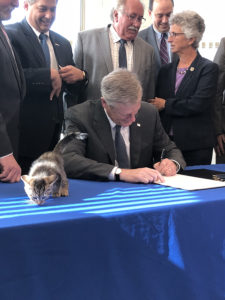How a Bill Becomes a Law: PAWS II
As we talked about a few weeks ago, the PAWS bill of 2014 was a wonderful example of how the legislature can be truly committed to protecting animals in Massachusetts.
After the tragic finding of a dog who had been sadistically tortured in 2013, the legislature acted to make sure other animals would not suffer this fate.
With the bill moving on a rapid timeline, concerns were raised that more laws regarding animal welfare needed strengthening. The legislature convened a task force to examine some of these issues. The task force included representatives from animal welfare groups including ARL, law enforcement, attorneys, animal control, and human service providers.
The Task Force
The task force report had numerous recommendations to improve animal welfare in the commonwealth:
-
- It proposed ending the cruel requirement that animals seized from fighting operations must be euthanized, instead allowing individual assessment of animals.
- It would clarify that drowning animals was inhumane.
- Another recommendation was that landlords be required to check vacant properties for pets.
There were many other more technical suggestions that would strengthen animal welfare ordinances across cities and towns.
The results of the Task Force’s findings would be the basis for an extension of the PAWS bill, this one appropriately called PAWS II.
Legislation

Governor Charlie Baker signing PAWS II into law.
PAWS II was filed in January in 2017, largely mirroring the recommendations of the task force assembled in 2014.
The hearing for the bill was held in October of the first year of the session, and was reported favorably by the committee in December of 2017.
This gave PAWS II a much longer timeframe to get passed than the first PAWS bill.
In March of 2018, the Senate debated the bill.
Two months later, the House debated their version.
The two had to be reconciled, and on July 17, a conference committee was appointed to settle the differences between the two branches. The group had two weeks to come to an agreement.
The final agreement came late in the final day of the session on July 31.
The conference committee was able to secure many important proposals of the task force, including:
-
- allowing increased reporting of animal cruelty by human service agency staff;
- making animal control officers mandated reporters of abuse of elders, individuals with disabilities, and children;
- requiring landlords check vacant properties for abandoned animals;
- prohibiting the drowning of animals, update laws regarding animal sexual abuse, including prohibition on future ownership of animals;
- ending mandatory euthanasia of animals seized from animal fighting operations and allows for individual evaluation of animals;
- updating penalties and making technical changes improving enforcement of animal control laws, including improperly kept kennels.
The bill was engrossed in the late hours of the legislative session on July 31.
There were still the steps of enactment and being signed into law by the Governor.
Fortunately, both branches and the Governor recognized the importance of these common sense protections, and ARL was able to celebrate the signing of PAWS II at a ceremonial signing in September 2018.
PAWS II was able to move through the legislative process because of the hard work of legislators, staff, and advocates who contacted the legislature to make their voice known.
Want to learn more about how you can get involved in advocacy? Check out our Advocacy 101 post.

